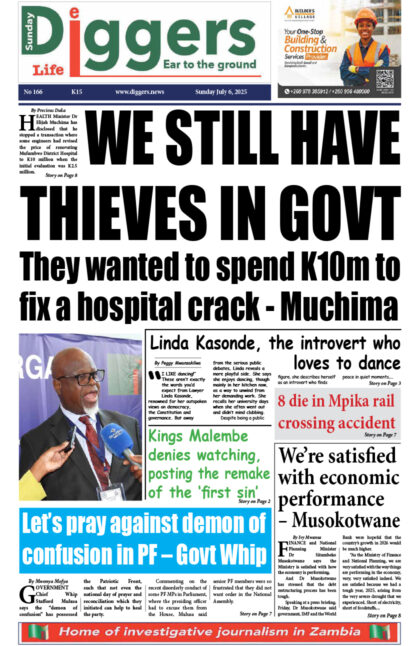The Public Order Act must go. Offensive sections to the freedom of assembly, association and speech had been struck down by the Supreme Court of Zambia in 1996 for they were more a hindrance to constitutional freedoms than they were regulatory. The Legislature tried to travel a compromising road by requiring notification to the police and postponement of a rally for genuine reasons to another suitable date. There was also a provision to appeal to the Minister of Home Affairs if the police did not grant the holding of an event.
It is common cause that the police have been applying the law unequally or not at all, on political grounds. Let’s put it this way: this police force has been abusing the Public Order Act on political grounds, with the connivance of the state, overtly or covertly. The drafters of the legislation are to blame. How on earth do you entrust the transmission and exercise of democracy to a policeman and if that policeman doesn’t grant the permit, you appeal to a Minister who is a cadre in the government of the day? Democracy must never be left to the whims of a policeman or a Minister in the government.
Some people may argue that it is not the law that is the problem, it is its application. Sometimes with respect to other laws, that may be the issue. With respect to the Public Order Act, it is the very law and its discretionary grants, that is the problem, it’s very existence in a politics on steroids.
We saw this charade recently when a policeman denied a permit to democratic activists who wanted to exercise their democratic rights on budget day at Parliament. In a hallucinatory awakening, the policeman denied the permit on national security grounds. There was no background as to what national security crises could arise out of this exercise of constitutional rights and as everyone knows the Minister allowed the demonstration and no security disturbances arose or resulted. The policeman simply lied and the result put paid to his tormented and politically induced lies. The fact that after the policeman denied the permit, the constitutional activists had to beg for permission from the Minister to exercise their hard-won constitutional rights, and the Minister granted the begging, should not be regarded as a consolation and justification for Zambia’s seemingly glorified democracy. This step should be seen as an embarrassment to democracy. We should never beg for democracy like that. We overthrew colonialism on constitutional liberties grounds. We overthrew the one party state dictatorship on constitutional liberties grounds. By now we should never tolerate the restrictions of our liberties by appealing to the so-called enlightened and benevolent actions of political cadres of the ruling party. This is an insult to our experiences and intelligence. Do not beg for democracy. Exercise your democratic rights. Take your democracy seriously.
In striking down the old and offending sections of the Public Order Act in the Christine Mulundika case, His Lordship Chief Justice Ngulube wrote, “The Broader question arising in this appeal is whether in this day and age, with only four years to go to the end of the twentieth century, it is justifiable in a democracy that the citizens of this country can only assemble and speak in public with prior permission which permission is not guaranteed and whether the law under attack is consistent with guaranteed freedom of assembly and speech”. The answer was in the negative. The offending sections were struck down. What has changed 18 years after the dawn of the twentieth century? The police apply the law now as if it had never been struck down and parliament simply required notification but not hindrance. But hindrance is what the policeman imposes. Now what if the Ministerial cadre also refuses the permit. Then what? There was much jubilation when the Minister allowed the exercise of constitutional rights to assemble and speak in Sinda a while ago as there has been relief that the Minister allowed constitutional rights to be exercised on budget day 2019. A nation should never rely for its democratic largesse on an individual. Zambia is not a Monarchy.
In the 1996 decision mentioned above, Chief Justice Ngulube wrote, “The fact or possibility that permission to assemble and to speak may be refused- so that the constitutional freedoms are denied altogether- on improper or arbitrary grounds or even on unknown grounds, renders the subsection objectionable for a variety of reasons”. In Zambia, this is still the elephant in the room. The Public Order Act must go.
Let’s also confront another issue: as far as members of the ruling party are concerned, the Public Order Act is not a hindrance. They are not subjected to it. They don’t have to seek a permit. They just demonstrate anytime, any place, anywhere. And the police do nothing about this. The Minister does nothing about this. Thus even in law, this Public Order Act can be struck down because of its unequal application by the police with the silent or condoned acquiescence of the party in power. As long as Justice Ngulube walked the halls of Zambia’s judiciary, his words on the Public Order Act must still echo and thus must guide the new judiciary in any judgment on the equal application or lack thereof of the Public Order Act.
The Speaker of the National Assembly wants the Public Order Act to be reformed. The Minister of Justice wants the Public Order Act to be reformed. The National Dialogue Forum wants the Public Order Act to be reformed. Zambians want the Public Order Act to be reformed.
But along with Professor Muna Ndulo, I say the Public Order Act must go.
(Dr. Munyonzwe Hamalengwa teaches Criminal Law; Law of Evidence; Forensic Science and Research and Writing Methodologies in Law, in Law School. He is the author of several books on law and politics.)



















